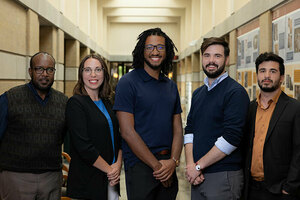
Five new students representing four disciplines have arrived to the Kroc Institute as part of its interdisciplinary Doctoral Program in Peace Studies in fall 2023. Incoming students were selected from a highly competitive pool of applicants from around the world. These students join the Institute’s 26 other doctoral students, for a total of 31 students in the 2023-24 academic year.
“Our incoming students were selected from an applicant pool of more than 400 - our largest ever number of applications,” said Caroline Hughes, Rev. Theodore M. Hesburgh, C.S.C., Chair in Peace Studies and director of doctoral studies. “Among our new cohort, we have four speakers of Arabic and one of Persian, not to mention language competencies in Indonesian, Turkish and French. We are delighted to welcome these five Ph.D. students to the Kroc Institute community.”
The doctoral program is a partnership between the Kroc Institute for International Peace Studies, part of the Keough School of Global Affairs, and the University of Notre Dame’s College of Arts and Letters departments of anthropology, history, political science, psychology, sociology, and theology.
This year’s incoming students include:
Wasal Faqiryar (peace studies and anthropology) holds an M.A. in politics and security from the OSCE Academy, as well as an M.A. in anthropology, urbanism and international development from the American University of Central Asia. He holds a diploma in diplomacy and political science from the Institute of Diplomacy and received his B.A. in law and political science from Kabul University. Faqiryar co-founded the Rumi Organization for Research, a place for scholars from Afghanistan and around the world to conduct academic research.
Julie Hawke (peace studies and sociology) is committed to understanding the impacts of digital technologies on conflicts and how best to leverage their use in strategic peacebuilding efforts. She brings a decade of experience in third-party conflict engagement, global youth peace education, and digital peacebuilding program design and management to her Ph.D. studies,which will center on defining conditions for positive intergroup contact in online spaces. Hawke obtained her M.A. in conflict resolution as a Luce Fellow from the Josef Korbel School of International Studies at the University of Denver and earned a B.A. in anthropology with an intercultural peacebuilding focus at BYU-Hawaii. Hawke is a Notre Dame Presidential Fellow.
Cody Jackson (peace studies and sociology) received his M.A. in conflict management from Kennesaw State University where he studied the effects of anti-blackness on young Black men. Jackson served as a Peace Corps volunteer in Indonesia, teaching English at a vocational high school. Jackson’s research goals are geared toward understanding resistance as a pedagogy through studying resistance movements and the lives of oppressed people, mainly through the Black experience.
Will O’Brien (peace studies and history) holds an M.A. in global politics from SOAS, University of London, and a B.A. in religion with a minor in Arabic from the University of Rochester. O’Brien has worked in foreign policy and international development in Washington, D.C., London, and Cairo, Egypt. In his most recent roles, he served as a speech writer, research assistant, and executive assistant to senior leaders at the Atlantic Council and the United States Institute of Peace. During his doctoral studies, O’Brien plans to historicize the influence of Western Christianity’s expansion into North Africa and the Middle East, and interrogate the subsequent wave of secularization on political systems, religious actors, and development theologies in conflict and post-conflict settings. O’Brien is a Notre Dame Presidential Fellow.
Raege Omar (peace studies and political science) has research interests in forced migration, conflict memory, and transnational social movements in legal mobilization. He hopes to use his research in these areas to build upon the renewed global shift toward more accountability against impunity in gross human rights violations. He received an M.S. in sociology at the University of Texas, San Antonio. Omar is a Dean’s Fellowship recipient.
Read full bios of all peace studies doctoral students.
In addition to welcoming new students, seven current Ph.D. students have been awarded named fellowships funded by the Kroc Institute Advisory Board members at the beginning of the 2023-24 academic year:
Ali Altiok (peace studies and political science), Francesca Freeman (peace studies and history), Joryán Hernández (peace studies and theology), and Adedoyin Okanlawon (peace studies and psychology) have been named 2023-24 Mullen Family Fellows. The Mullen Family Fellowships were created in 2008 thanks to the generosity of the family of Jack Mullen (B.S. ‘53), chair of the Kroc Institute’s Advisory Council from 2003-2016. Jack’s daughter, Paddy Mullen (B.A. ‘80) serves as the current chair of the Kroc Institute Advisory Board.
Patrick McQuestion (peace studies and political science) is the 2023-24 Darby Fellow. The Darby Fellowship was established in 2010 in memory of John Darby, professor of comparative ethnic studies at Notre Dame from 1999 until his death in 2012. The award is given annually to students who exemplify his commitment to rigorous, normatively-informed scholarship on peacebuilding and conflict resolution.
Khan Shairani (peace studies and history) has been named this year’s Steven D. Pepe Ph.D. Fellow in Peace Studies. The Pepe Fellowship is the result of a generous gift from The Honorable Steven D. Pepe (B.A. ‘65), a retired U.S. Magistrate Judge (Michigan) and member of the Kroc Institute’s Advisory Board. Pepe’s gift provides ongoing support for doctoral students in peace studies who have distinguished themselves in research, teaching, or service.
Flora Tang (peace studies and theology) continues her five-year appointment as the John and Judy Scully Fellow in Peace Studies. The Scully Fellowship is the result of a generous donation by John Scully (B.A. ‘64) and Judy Scully, members of Kroc Institute’s Advisory Board and longtime supporters of the Institute.
Established in 2008, the Kroc Institute offers the world’s only fully-joint Ph.D. program between peace studies and one of six traditional disciplines. Peace studies doctoral graduates are prepared for a wide range of scholarly, teaching, and professional positions.
Applications for the 2024-25 academic year are due by December 15, 2023. Learn more.
Contact: Kathryn Sawyer Vidrine, krocphd@nd.edu